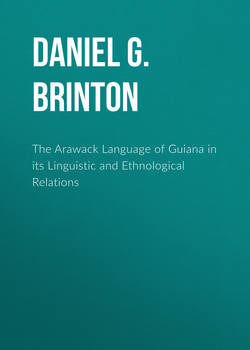Читать книгу The Arawack Language of Guiana in its Linguistic and Ethnological Relations - Daniel G. (Daniel Garrison) Brinton - Страница 6
ADJECTIVES
ОглавлениеThe verb is the primitive part of speech in American tongues. To the aboriginal man every person and object presents itself as either doing or suffering something, every quality and attribute as something which is taking place or existing. His philosophy is that of the extreme idealists or the extreme materialists, who alike maintain that nothing is, beyond the cognizance of our senses. Therefore his adjectives are all verbal participles, indicating a state of existence. Thus üssatu good, is from üssân to be good, and means the condition of being good, a good woman or thing, üssati a good man.
Some adjectives, principally those from present participles, have the masculine and neuter terminations i and u in the singular, and in the plural i for both genders. Adjectives from the past participles end in the singular in issia or üssia, in the plural in annu. When the masculine ends in illi, the neuter takes urru, as wadikilli, wadikurru, long.
Comparison is expressed by adding bén or kén or adin (a verb meaning to be above) for the comparative, and apüdi for the diminutive. Ubura, from the verb uburau to be before in time, and adiki, from adikin to be after in time, are also used for the same purpose. The superlative has to be expressed by a circumlocution; as tumaqua aditu ipirrun turreha, what is great beyond all else; bokkia üssá dáuria, thou art better than I, where the last word is a compound of dai uwúria of, from, than. The comparative degree of the adjectives corresponds to the intensive and frequentative forms of the verbs; thus ipirrun to be strong, ipirru strong, ipirrubîn and ipirrubessabun to be stronger, ipirrubetu and ipirrubessabutu stronger, that which is stronger.
The numerals are wonderfully simple, and well illustrate how the primitive man began his arithmetic. They are: —
1 abba.
2 biama, plural biamannu.
3 kabbuhin, plural kubbuhinínnu.
4 bibiti, plural bibitinu.
5 abbatekkábe, plural abbatekabbunu.
6 abbatiman, plural abbatimannínu.
7 biamattiman, plural biamattimannínu.
8 kabbuhintiman, plural kabbuhintimannínu.
9 bibitiman, plural bibititumannínu.
10 biamantekábbe, plural biamantekábunu.
Now if we analyze these words, we discover that abbatekkábe five, is simply abba one, and akkabu, hand; that the word for six is literally “one [finger] of the other [hand],” for seven “two [fingers] of the other [hand],” and so on to ten, which is compounded of biama two, and akkabu hands. Would they count eleven, they say abba kutihibena one [toe] from the feet, and for twenty the expression is abba lukku one man, both hands and feet. Thus, in truth, they have only four numerals, and it is even a question whether these are primitive, for kabbuhin seems a strengthened form of abba, and bibuti to bear the same relation to biama. Therefore we may look back to a time when this nation knew not how to express any numbers beyond one and two.
Although these numbers do not take peculiar terminations when applied to different objects, as in the languages of Central America and Mexico, they have a great variety of forms to express the relationship in which they are used. The ordinals are:
atenennuati, first.
ibiamattéti, second.
wakábbuhinteti, our third, etc.
To the question, How many at a time? the answer is:
likinnekewai, one alone.
biamanuman, two at a time, etc.
If simply, How many? it is:
abbahu, one.
biamahu, two.
If, For which time? it is:
tibíakuja, for the first time.
tibíamattétu, for the second time.
and so on.
